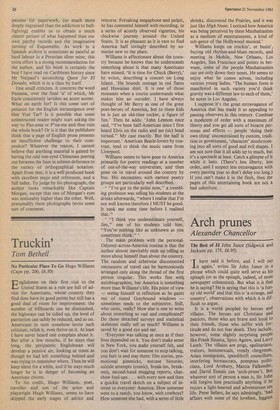Truckin'
Tom Bethel!
No Particular Place To Go Hugo Williams (Cape pp. 200, £6.50) Englishmen on their first visit to the United States as a rule are full of advice for Americans, whose country they find does have its good points but still has a good deal of room for improvement: the number of billboards can be diminished, the highways can be tidied up, the level of patriotism can safely be reduced, and so on. Americans in turn somehow invite such criticism, relish it, even thrive on it. At least I have never heard one complain about it. But after a few months, if he stays that long, the peripatetic Englishman will develop a pensive air, looking at times as though he had left something behind and was trying to remember where. Then he will keep silent for a while, and if he stays much longer he is in danger of becoming an American citizen.
To his credit, Hugo Williams, poet, traveller and son of the actor and playwright Hugh Williams, seems to have skipped the early stages of advice and remorse. Forsaking megaphone and pulpit, he has contented himself with recording, in a series of acutely observed vignettes, his clockwise journey around the United States. It is as pleasant as it is rare to find America half lovingly described by someone new to the place.
Williams is affectionate about the country because he knows that he understands something about it that many Americans have missed. 'It is time for Chuck (Berry),' he writes, describing a concert on Long Island. 'He bounds onstage in red flares and Hawaiian shirt. It is one of those moments when a tourist understands what makes him an outsider. I have always thought of Mr Berry as one of the great poet-heroes of America, but to these kids he is just an old-time rocker, a figure of fun.' Then he adds: 'John Lennon once said, "I've been half-American since I first heard Elvis on the radio and me (sic) head turned." My case exactly. But the half is important.' American Beatle-lovers by contrast, tend to think the music came from Liverpool.
Williams seems to have gone to America primarily for poetry readings at a number of out-of-the-way universities, and then gone on to travel around the country by bus. His encounters with earnest poetry groups are particularly well described.
"I've got to the point now," a trembling professor was telling his students at the drinks afterwards, "where I realise that I'm not well known therefore I MUST be good. It took me some time before I realised that."
' "I think you underestimate yourself, Jim," one of his students told him. "You're nothing like as unknown as you sometimes think." ' The main problem with the personalOdyssey-across-America routine is that the author almost inevitably ends up telling us more about himself than about the country. The random and otherwise disconnected encounters of travel can be harmoniously arranged only along the thread of the first person singular. This works fine with autobiographies, but America is something more than Williams's life. His point of view — seeing himself in reflection as he gazes out of tinted Greyhound windows — sometimes tends to the subjective. Still, who cares, really? How else is one to write about something so vast and complicated? Do those detached surveys and statistical skeletons really tell us much? Williams is saved by a good eye and ear.
'Everyone was talking at once as if their lives depended on it. You don't make sense in New York, you make yourself felt, and you don't wait for someone to stop talking, you butt in and stay there: film stories, promotional gimmicks, nutcase histories, suicide attempts (comic), break-ins, breakouts, second-hand mugging reports, chatshow foul-ups. . . with every now and then a quickie travel sketch on a subject of interest to everyone: America. How someone went to a ranch, you know, with cowboys? How someone else had, with a series of little shrieks, discovered the Prairies, and it was just like High Noon. I noticed how America was being perceived by these Manhattanites as a medium of entertainment, a kind of sub-genre of the Hollywood musical.'
Williams keeps on truckin', or busin', buying old rhythm-and-blues records, and meeting in Mobile, New Orleans, Los Angeles, San Francisco and points in between, some of the people Manhattanites can see only down their noses. He seems to enjoy what he comes across, including various young ladies. 'The human form is manifested in such variety you'd think gravity was a different law to each of them,' he notes in Los Angeles.
I suppose it's the great extravagance of America that has made it so appealing to passing observers in this century. Combine a modicum of order with a maximum of liberty and you get all sorts of bizarre personas and effects — people 'doing their own thing' unconstrained by custom, tradition or government, 'character' mushrooming into all sorts of good and evil shapes. I am not sure that it all adds up to much, but it's a spectacle at least. Catch a glimpse of it while it lasts. (There's less liberty, less order, and I suspect less extravagance with every passing year so don't delay too long.) If you can't make it in the flesh, then the pages of this entertaining book are not a bad substitute.










































 Previous page
Previous page